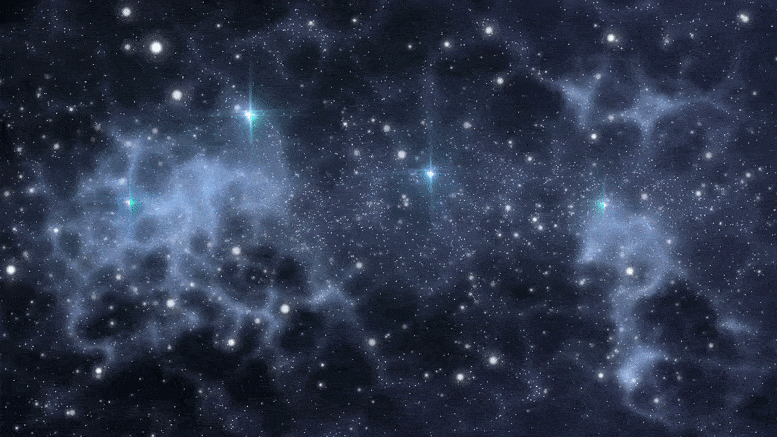
Według nowych badań niewidzialny „świat lustrzany” cząstek oddziałujących z naszym światem wyłącznie za pomocą grawitacji może być kluczem do rozwiązania problemu stałej Hubble’a.
Według nowych badań niewidzialny „świat lustrzany” cząstek oddziałujących z naszym światem wyłącznie za pomocą grawitacji może być kluczem do rozwiązania wielkiej tajemnicy w dzisiejszej kosmologii – Stały problem Hubble’a.
ten Stała Hubble’a Jest to obecne tempo ekspansji wszechświata. Prognozy dla tego wskaźnika – ze Standardowego Modelu kosmologii – są zauważalnie wolniej Na podstawie stawki nasze lokalne pomiary okazały się najdokładniejsze. To jest niesamowite niespójność niespójność niespójność Jest jedną z wielu kosmologów próbując to rozwiązać Zmieniając nasz obecny model kosmologiczny. Wyzwaniem jest zrobienie tego bez psucia zgodności między przewidywaniami modelu standardowego a wieloma innymi zjawiskami kosmicznymi, takimi jak kosmiczne mikrofalowe tło. Ustalenie, czy taki kosmiczny scenariusz istnieje, jest pytaniem, nad którym pracowali naukowcy, w tym Francis Jan Sir Racine, profesor nadzwyczajny na Wydziale Fizyki i Astronomii na Uniwersytecie Nowego Meksyku, VJ oraz Lloyd Knox na Uniwersytecie Kalifornijskim, Davis odpowiedzieć.
kosmologia Jest to naukowe badanie wielkoskalowych właściwości Wszechświata jako całości. Stara się wykorzystać metodę naukową, aby zrozumieć pochodzenie, ewolucję i ostateczny los całego wszechświata. Jak każda dziedzina nauki, kosmologia wiąże się z tworzeniem teorii lub hipotez dotyczących wszechświata, które zawierają konkretne przewidywania zjawisk, które można przetestować poprzez obserwacje. W zależności od wyniku obserwacji, teorie będą musiały zostać porzucone, zrewidowane lub rozszerzone, aby uwzględnić dane. tak zwane Teoria Wielkiego Wybuchu Jest to dominująca teoria dotycząca pochodzenia i ewolucji wszechświata.
Dla mnie[{” attribute=””>NASA, cosmology is the scientific study of the large-scale properties of the universe as a whole. Cosmologists study concepts such as dark matter, and dark energy and whether there is one universe or many, sometimes called a multiverse. Cosmology entails the entire universe from birth to death with mysteries and intrigue at every turn.
Now, Cyr-Racine, Ge, and Knox have discovered a previously unnoticed mathematical property of cosmological models which could, in principle, allow for a faster expansion rate while hardly changing the most precisely tested other predictions of the standard cosmological model. They found that a uniform scaling of the gravitational free-fall rates and photon-electron scattering rate leaves most dimensionless cosmological observables nearly invariant.
“Basically, we point out that a lot of the observations we do in cosmology have an inherent symmetry under rescaling the universe as a whole. This might provide a way to understand why there appears to be a discrepancy between different measurements of the Universe’s expansion rate.”
The research, titled “Symmetry of Cosmological Observables, a Mirror World Dark Sector, and the Hubble Constant,” was published recently in the journal Physical Review Letters.

The COBE satellite was developed by NASA’s Goddard Space Flight Center to measure the diffuse infrared and microwave radiation from the early universe to the limits set by our astrophysical environment. Credit: NASA
This result opens a new approach to reconciling cosmic microwave background and large-scale structure observations with high values of the Hubble constant H0: Find a cosmological model in which the scaling transformation can be realized without violating any measurements of quantities not protected by the symmetry. This work has opened a new path toward resolving what has proved to be a challenging problem. Further model building might bring consistency with the two constraints not yet satisfied: the inferred primordial abundances of deuterium and helium.
If the universe is somehow exploiting this symmetry researchers are led to an extremely interesting conclusion: that there exists a mirror universe very similar to ours but invisible to us except through gravitational impact on our world. Such “mirror world” dark sector would allow for an effective scaling of the gravitational free-fall rates while respecting the precisely measured mean photon density today.
“In practice, this scaling symmetry could only be realized by including a mirror world in the model — a parallel universe with new particles that are all copies of known particles,” said Cyr-Racine. “The mirror world idea first arose in the 1990s but has not previously been recognized as a potential solution to the Hubble constant problem.
“This might seem crazy at face value, but such mirror worlds have a large physics literature in a completely different context since they can help solve important problem in particle physics,” explains Cyr-Racine. “Our work allows us to link, for the first time, this large literature to an important problem in cosmology.”
In addition to searching for missing ingredients in our current cosmological model, researchers are also wondering whether this Hubble constant discrepancy could be caused in part by measurement errors. While it remains a possibility, it is important to note that the discrepancy has become more and more significant as higher quality data have been included in the analyses, suggesting that the data might not be at fault.
“It went from two and a half Sigma, to three, and three and a half to four Sigma. By now, we are pretty much at the five-Sigma level,” said Cyr-Racine. “That’s the key number which makes this a real problem because you have two measurements of the same thing, which if you have a consistent picture of the universe should just be completely consistent with each other, but they differ by a very statistically significant amount.”
“That’s the premise here and we’ve been thinking about what could be causing that and why are these measurements discrepant? So that’s a big problem for cosmology. We just don’t seem to understand what the universe is doing today.”
Reference: “Symmetry of Cosmological Observables, a Mirror World Dark Sector, and the Hubble Constant” by Francis-Yan Cyr-Racine, Fei Ge and Lloyd Knox, 18 May 2022, Physical Review Letters.
DOI: 10.1103/PhysRevLett.128.201301

„Kawioholik. Fanatyk alkoholu na całe życie. Typowy ekspert podróży. Skłonny do napadów apatii. Internetowy pionier”.











More Stories
Boeing może nie być w stanie obsługiwać pojazdu Starliner przed zniszczeniem stacji kosmicznej
Jak czarne dziury stały się tak duże i szybkie? Odpowiedź kryje się w ciemności
Studentka Uniwersytetu Północnej Karoliny zostanie najmłodszą kobietą, która przekroczy granice kosmosu na pokładzie Blue Origin